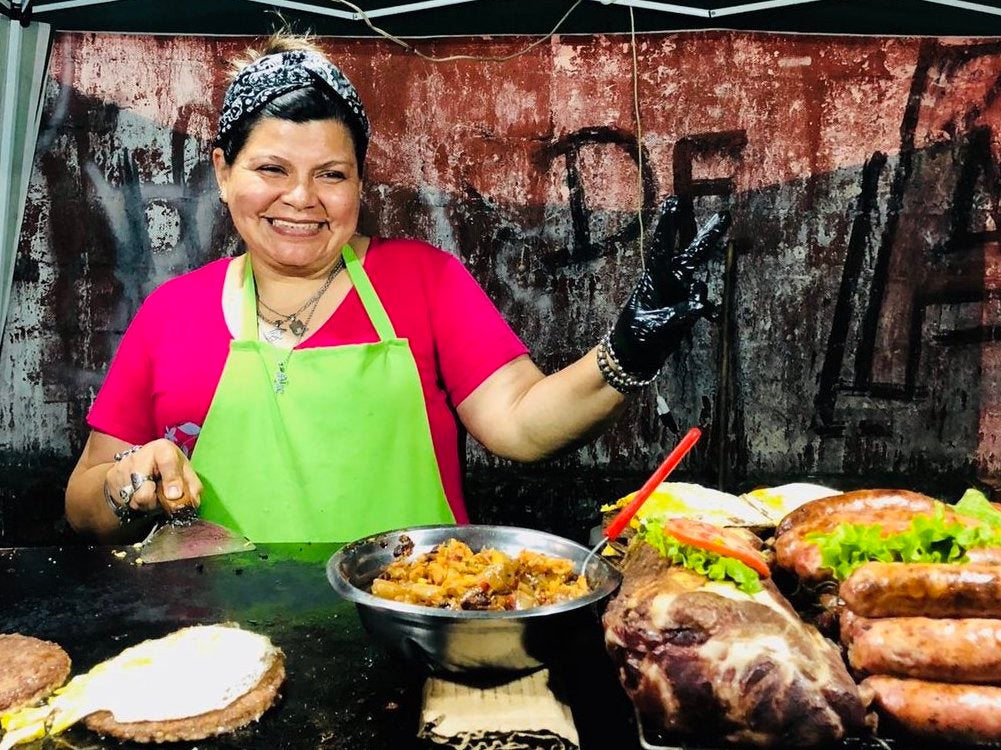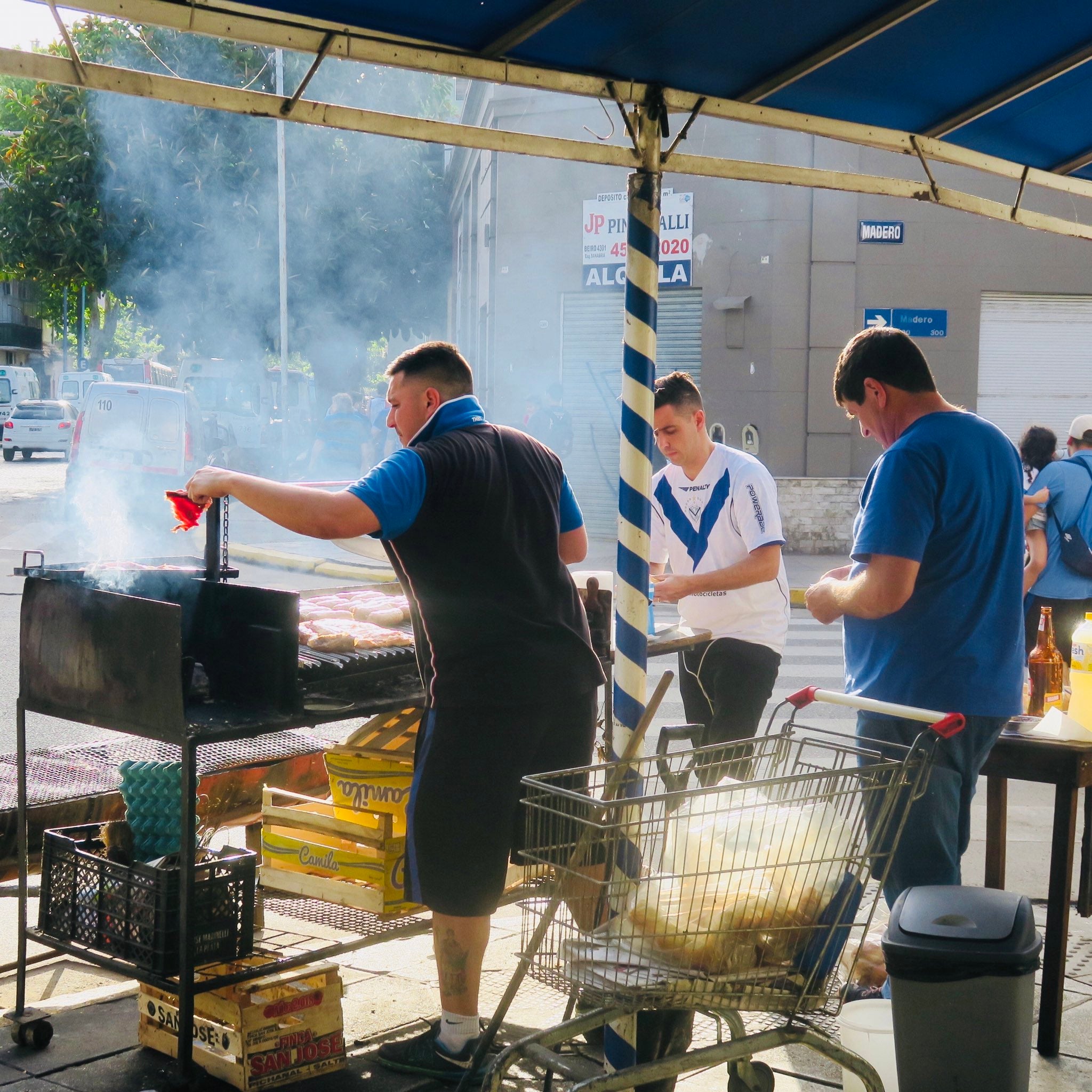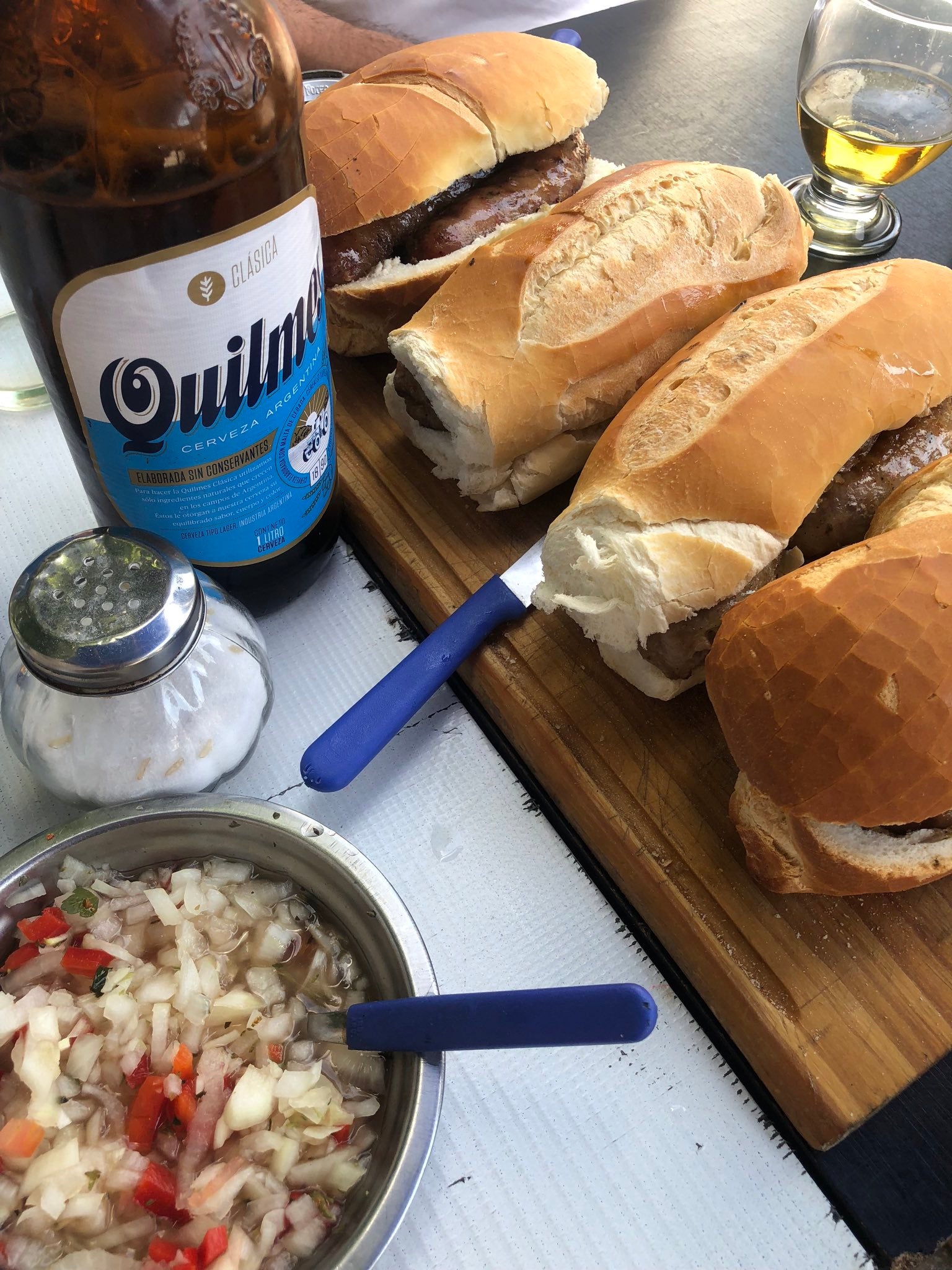In Argentina, as in all football, food is an important part of the experience - but now the sacred ‘choripan’ is under threat
It was a dish deemed good enough for a visiting Donald Trump last year, but Dan Edwards explains how the humble choripán has found itself at the centre of a tug-of-war with political undertones

Your support helps us to tell the story
From reproductive rights to climate change to Big Tech, The Independent is on the ground when the story is developing. Whether it's investigating the financials of Elon Musk's pro-Trump PAC or producing our latest documentary, 'The A Word', which shines a light on the American women fighting for reproductive rights, we know how important it is to parse out the facts from the messaging.
At such a critical moment in US history, we need reporters on the ground. Your donation allows us to keep sending journalists to speak to both sides of the story.
The Independent is trusted by Americans across the entire political spectrum. And unlike many other quality news outlets, we choose not to lock Americans out of our reporting and analysis with paywalls. We believe quality journalism should be available to everyone, paid for by those who can afford it.
Your support makes all the difference.American football has its tailgates, while since time began baseball fans have gorged on a diet of beer, peanuts and hot dogs as their heroes tussle out on the diamond. In football stadiums across England, the savoury pie has become synonymous with matchday cuisine, a comforting combination of sometimes indistinguishable animal parts and a pastry crust that warms the heart on a cold winter's afternoon.
Across the globe, food is an inseparable part of the live sporting experience. Argentina is no exception. The country that gave us some of football's greatest-ever players, from Di Stefano and Sívori to Maradona and Messi, is also the home of one of the game's most delectable pre or post-match treats: the choripán. This gastronomic masterpiece, however, might now be under threat.
The choripan itself is a model of simplicity. A single chorizo sausage – the raw, lightly spiced kind found across South America rather than its cured, more fiery Spanish cousin better known in Europe – grilled over charcoal, cut down the middle (a style evocatively referred to as a la mariposa, or in the shape of a butterfly) and served between two slices of crusty bread toasted over the same coals.
Accompanying ingredients are strictly at the consumer's discretion: spicy (by local standards) chimichurri sauce is favoured by some, while others opt for the tangy raw onion and pepper taste of salsa criolla. There are even deep, dark corners of Argentina which favour smothering this delicacy in mayonnaise, a practice which above all seems overkill given that the average chori weighs in at a hefty four hundred and fifty calories and provides ample lashings of saturated fats, carbohydrates and sodium. This is not a health-conscious choice by any means, but after that first taste of chorizo it is difficult to stay away.
Argentines in particular cannot get enough of the treat.

No weekend barbecue is complete without at least one choripán consumed per person as a starter, while on many occasions the sandwich is the star of the show by itself. In Córdoba, every year a 'World Choripán Festival' attracts legions of visitors, who combined and according to the organisers' estimates put away around forty thousand choris, or some eighteen million calories in bread and processed pork. Where the food really comes into its own though is as the food of the gathered masses: be it a football match, rock concert or even a political rally, one does not have to wander far before the distinctive pungent aroma of chorizo and thick smoke of sellers' improvised pavement barbecues assaults the senses.
But in Buenos Aires, at least, that tradition may be coming to an end. In January the capital government – which commands a jurisdiction that includes the homes of heavyweights like Boca Juniors, River Plate, San Lorenzo and a total of twenty professional clubs - announced that no more permits would be given out for the “making and selling of food products in the areas surrounding the City's stadiums on the days and times sporting events are being carried out.” Admittedly, the number of the stands that actually possessed said permits was almost laughably low: the same city authorities detailed just nine such establishments, four of which saw their permit renewal refused, three whose permission is now expired, one seller whose license was revoked and another establishment which has won an injunction to stay in business, albeit more than one kilometre from the ground. The measure nevertheless threatens to reach much further than it would initially seem. Previously tolerated by security authorities, the dozens of improvised stands that pop up around stadiums on a weekly basis now face extinction, with their presence at weekend games at Boca and San Lorenzo at the start of February already much reduced.
The government has justified the decision in terms of health and safety.
There are few controls on such stalls, raising understandable concerns on the grounds of hygiene and food quality, although problems arising from the consumption of street-side choris are mercifully rare. More seriously, sellers are often trapped in the grasp of the unscrupulous barras bravas, Argentina's notoriously violent organised hooligan factions who charge extortionate 'rental' fees to those setting up on their turf. In the wake of those horrific scenes that forced November's Copa Libertadores final between River and Boca to be first suspended and then moved across the Atlantic to Spain , any steps to rein in the barras is to be applauded. But the feeling is that Buenos Aires authorities are attacking the victims rather than the criminals, cracking down on the weakest link of this criminal enterprise while leaving those at the top alone. It is also yet another attack on the traditional Argentine match-day experience, already fraught with inconveniences and dangers for fans.
Contrary to their reputation as freewheeling dens of chaotic madness, local stadiums are among the most restrictive on the planet, with existing security measures placed on fans so draconian they would shock contemporaries in the United Kingdom or United States. Not only is the sale of alcohol subject to a blanket ban in the ground itself, most municipalities extend that prohibition to a radius of up to ten blocks in surrounding areas. Match-goers endure a minimum of two security checks, with plastic bottles, cigarette lighters and even belts liable to be confiscated by armed police.
Once inside the stadium itself fans are herded into concrete pens, separated from the playing surface by razor wire. Here the law of the jungle is in force: with no police or stewards permitted the terraces are self-policing, and if fights do break out or if fans suffer robberies or other criminal acts it is largely up to fellow supporters or the aforementioned barra, largely exempt from the above restrictions thanks to their power, to restore order. The atmosphere at the likes of Boca, River and Argentina's biggest clubs remains a unique experience, but more and more it is becoming an experience that turns off families and casual supporters.
“Having a chori prior or after the game is one of the things when you're abroad, you miss the most,” renowned journalist and producer Sebastián García explains. “The smell of the parrillas as you walk towards the ground, really gets you going. Just like you know it's going to rain because you can smell it in the air, you know you're going to watch football when the smoke of choripan gets through your nose.
“Taking away this tradition of having a choripan prior/after the game, could sound like a silly thing, but the message is to make the experience of going to the ground a bit less enjoyable so you stay at home and pay to watch it on the television.”
The parrilla owners themselves are also organising. In a country where poverty levels even out at above thirty per cent, unemployment is steadily rising and astronomic inflation cuts into every budget, chori sellers form part of a full third of the Argentine population that works in the informal economy, without rights, guaranteed salary or protection against dismissal or workplace injuries. Prior to San Lorenzo's weekend clash against Independiente members of the Confederation of Popular Economy Workers (CTEP) handed out leaflets in Bajo Flores imploring the government to seek alternatives to the measure. “We are workers who with dignity put food on the table for our families. More than two hundred families who sell food, drink and merchandise in the areas around football stadiums. We form part of the folklore and popular culture in our country. We want to formalise our activity, not be expelled,” the organisation explained.
“It took us by surprise but we are already out there with the 'Yes to the choripán' campaign,” CTEP representative Andrés Dorigo stated. “We were in San Lorenzo and Boca and this week we will hold a choripán cookout at [Buenos Aires landmark] the Obelisco and will continue this Sunday at River.” Dorigo asserts that more than five thousand people have signed a petition calling on the government to revert their decision. “They are not just leaving a lot of families without work, they are also cutting off a tradition. Part of our folklore is sharing a chori or hamburger before or after a game, not just watching and leaving. This is part of popular culture, and trying to cut it out makes no sense. It is part of a logic on the government's part where it seems everything popular is a bad word.”

The presence of the chori in popular movements is undisputed. As mentioned above, no political rally or protest is complete without the same stalls that dot the entrance to football matches, providing sustenance to those who in many cases have travelled hours from the furthest reaches of Buenos Aires or elsewhere in Argentina to express their approval or disapproval of government decisions. “They have only come for the chori and a Coca-Cola,” is an oft-repeated reactionary refrain, particularly when the march is made up of peronist or left-wing activists in opposition to the centre-right liberal government of current president Mauricio Macri.
The implication is that those on the margins of Argentine society 'sell' their support or opposition for a sandwich and soft drink, bussed in from impoverished neighbourhoods and without the slightest idea what they are fighting for or against, a prejudice that Macri himself has at times attempted to exploit for his own ends. “It's great that so many people think we can build a future, and we express it from our heart, spontaneously, without buses or choripáns,” the head of state gushed in response to a match convened in his favour back in 2017. That very same Macri welcomed Donald Trump, Theresa May and the rest of the G20 world leaders to Buenos Aires at the end of last year: at the inaugural dinner, his guests were served choripán.
There seems little doubt that the iconic chori will return to Buenos Aires' stadiums in the near-future. It will most likely make its comeback in a revamped, slightly more aesthetically pleasing and, equally likely, much more expensive form, sold out of a trailer with nonsensical English buzzwords painted on the side. Food trucks are a particular fetish of city mayor and Macri ally Horacio Rodríguez Larreta, who seems to see the concept as a fast track to making his jurisdiction a South American version of New York or London without solving any of the real issues that afflict citizens of the Argentine capital. Not coincidentally, the move would also bring sellers directly under the government's control, with the promise of substantial permit fees to engorge revenues.
Just a few kilometres to the south, however, the traditional stands still keep their fires going. On Sunday evening forty thousand Racing supporters filed out of their Cilindro home, delighted with a 3-1 victory over Huracán which keeps the Avellaneda side three points clear at the Superliga summit. And dotted along the adjoining Colón, Alsina or Italia streets, nothing had changed. The same intoxicating smell of roasting meats that is a challenge to any stomach; the cries of “I've got chori, I've got patties” and, occasionally, “Anything smaller, master? I've got no change.” In Avellaneda the local government headed by peronist mayor Jorge Ferraresi suffered a similar conundrum to that faced by the larger, far richer Buenos Aires but chose a different, more inclusive solution.
“In the municipality of Avellaneda, for Racing and Independiente games, the barbecues outside have been registered and controlled and we were part of those formalisation efforts,” Dorigo explained. “If there is political will we can do that, we have been asking for that same thing for more than a year.”
The stage is set, then, for a David vs. Goliath battle for Argentine football's soul. Certainly, a dried-out chori dressed with a generous spoonful of vinegary chimichurri could inflict a great deal of damage to one's eye. It remains to be seen, however, if the Buenos Aires government bows to pressure and seeks a compromise to this most delicate of situations that can keep sellers in business while also introducing controls and safety measures that can keep them out of the barras' reach and ensure a secure, hygienic working enviroment. Delicious stadium snack; food of the masses; national and political symbol; and now, the rallying point for humble workers and football fans against a government perceived as out of touch and losing the streets: there is much more to the humble choripán than meets the eye
Join our commenting forum
Join thought-provoking conversations, follow other Independent readers and see their replies
Comments